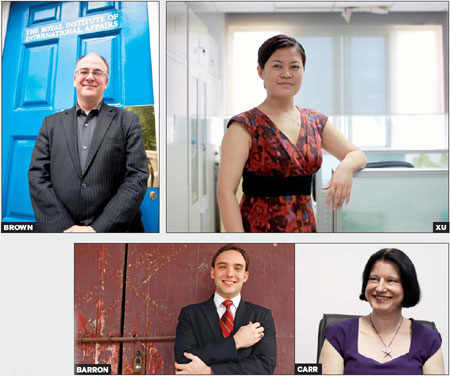A lot to think about

|
(Clockwise) Kerry Brown by Nick J B Moore / for China Daily Xu Wei by Wang Jing / China Daily Miranda Carr by Liu Zhe / China Daily Oliver Barron by Liu Zhe / China Daily Photo Credits |
|
(Clockwise) Isabel Hilton by Nick J B Moore / for China Daily Duncan Innes-Ker by Liu Zhe / China Daily Others are Provoded to China Daily Photo Credits |
Think tanks around the world grapple to come to terms with a rapidly changing China
What is the latest thinking on China? Western and Chinese think tanks and research organizations are engaged in a constant battle of ideas about China.
Their clients want to know what is happening because it could have a direct impact on them.
 |
These include the impact of China on the environment, security issues in the Pacific, whether cash-rich Chinese companies are about to buy everything in sight and also the implications of China's economic rise.
There are also issues as to whether the Western or outsiders' view of China is different from the people doing their thinking and research from within the country's borders.
One of the big questions currently is whether there has been any recent change in the terms of the debate about China.
Kerry Brown, head of the Asia Programme at Chatham House, one of Europe's leading foreign policy think tanks based in London, says the whole debate about China has had to suddenly speed up.
This, he argues, is because China in 2011 became the world's second-largest economy overtaking Japan, which had held that position for 42 years, quicker than anticipated.
"China has become the victim of its own success. No one really expected it to be in this position quite so quickly. This is partly because of the screw-up in the West since 2008," he says.
"Everyone had assumed China would be in this position five or 10 years down the road and so all the issues of how to accommodate a new power have come ahead of schedule."
Brown says the West now has to come to terms with the fact that decisions made in China can have a big impact on the rest of the world.
"The Chinese government can make quite big decisions that will have an impact on international markets, resources and on industrial policy," he says.
Over in Beijing, Miranda Carr, head of China research at NSBO, which provides research on China's economy to leading clients around the world, says one of the major issues is whether the China economic juggernaut can survive a seismic event such as the collapse of the euro.
She says the global economy has become dependent on China remaining a vibrant, successful economy.
"With one of the world's major currencies collapsing you would see a global crisis and massive instability and uncertainty and countries would go on into full-scale crisis mode on a global basis and China would be part of this."
Carr says China might not respond this time with a 4 trillion yuan ($645 billion, 509 billion euros) stimulus package as it did in 2008.
 |
"Policymakers have already anticipated slow export growth this year and only 20 percent of China's exports go to Europe so the response this time may be different."
Oliver Barron, head of NSBO's China office, adds that any euro collapse will come at a bad time for China.
"Growth already is forecast to turn out at between 7.5 percent and 8 percent this year which would be the worse since 2003 or 2005 so any major event like this would prove difficult."
James Fallows, board member of the Washington-based think tank New America Foundation and national correspondent for the Atlantic, says one of the most frequent questions he is asked is whether the China economy is going to unwind.
Speaking from the Aspen Ideas Festival in Colorado, he says the China economy has shown remarkable resilience.
"The Chinese economy has problems now but it has had them at any point in the last 30 years and has still moved forward, so we ought to recognize by now there is a lot of resilience built into it. It might not have the same level of growth this year but it will probably find ways to rebound," he says.
While the impact of global events may also be important to Xu Wei, a researcher from the China Center for International Economic Exchanges in Beijing, her key focus is on the Chinese consumer.
Boosting personal consumption is a major theme in the Chinese government's 12th Five-Year Plan (2011-15) so that it is less reliant on exports and investment in infrastructure for generating growth.
Xu says consumption is now a major area of research in China, particularly around the policies that need to be enacted to boost it.
"We need to expand household consumption because it is on a downward trend. The continued economic growth of China depends directly on consumption and it is playing a role in boosting economic growth."
She says the goal of policy needs to be to increase the income levels of low- and middle-income groups.
"We need to enhance people's ability to consume such as by accelerating improvements in the social security system, improving the well-being of people and making every effort to increase employment."
For Xu, there has to be greater investment in China's rural areas, the building of better transportation and power and water supply so they become closer to vibrant economic communities with higher consumption levels such as the wealthier major cities.
"There will be two effects. It will be easier to get cheap goods and services to rural markets and also it will be easier to get agricultural products to the urban markets."
The potential of new consumers in remote areas of China is also of major interest to many Western think tanks.
It is something that the Economist Intelligence Unit through its Access China regional team has been engaged in.
"There is a lot of interest in the internal growth story," says Duncan Innes-Ker, senior researcher at the Economist Intelligence Unit in London and a China specialist.
|
||||
"A lot of cities on the Yangtze River are seeing this double-digit growth. Companies wanting to make investment decisions are clearly interested in this information. Most of the international companies are still only in the first- and second-tier cities with one exception being Yum! Brands (owner of the KFC franchise)," Innes-Ker says.
Today's Top News
- Xi calls for promoting volunteer spirit to serve national rejuvenation
- Xi chairs CPC meeting to review report on central discipline inspection
- Reunification will only make Taiwan better
- Outline of Xi's thought on strengthening military published
- Targeted action plan to unleash consumption momentum
- Separatist plans of Lai slammed



































